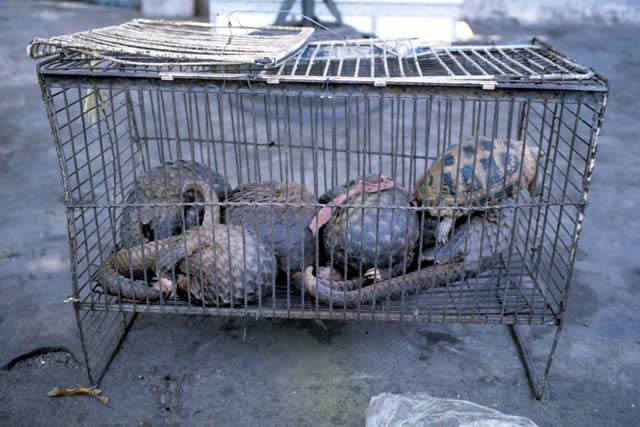More meat from endangered animals is being smuggled into China than ever before according to new police reports. Consumers would be shocked to realize most of their meat was actually smuggled into the country, despite almost always being labeled as locally bred. China’s meat market is the largest in the world and has attracted a number of illegal meat smuggling rings that do not draw lines between endangered species meat and allowed meat.
Police in Yongjia county in Zhejiang province, eastern China, recently busted an illegal meat smuggling ring responsible for distributing over $15.7 million in rare wildlife. The meat, which included live giant salamanders, turtle doves, leopard cats and pangolins, was distributed to more than 10 provinces in China. Frozen animal limbs and bear paws also featured in the assortment of game.
Police across the country have been shocked to discover that more than 20 per cent of the country’s leisure farms and restaurants were actually involved in the trade, far higher than initially expected.
The findings mean that about one in three Chinese restaurants and small-scale meat suppliers are engaged in the illicit trade of endangered animals.
Chinese authorities reported that the illegally distributed game was first purchased from the ring in the regions of Guangdong and Guangxi before being delivered to restaurant kitchens and markets. Before the journey, the smuggled animals would be tranquilized so as not to be discovered. They would then be revived after crossing the border by being injected with stimulants. Frozen animal meat would have their appearance improved by bleaching with hydrogen peroxide, illustrating both the environmental and food safety concerns with the smuggling.
Plenty of endangered species meat is smuggled into mainland China under Pu’er city in southwestern Yunnan, bordering Vietnam. In China’s Guangzhou market, you can find plenty of wild game offerings including Vietnamese crocodiles. It is estimated that approximately 100,000 Vietnamese crocodiles were eaten in Guangdong last year alone, 70 per cent of which were illegally smuggled.
The meat smuggling business has earned a reputation for being especially lucrative. Pangolin meat delivered alive to Zheijang province can be sold for $220-250 a kilo. Bear’ meat can fetch $250 a kilo and frozen game $95 a kilo. A restaurant purchasing a macaque at $63 from the illegal rings can sell the same for $157.
Police busts on the illegal rings have increased by up to three times this year. The scale of smuggling has become so rampant it is infuriating legal meat importers. They are now urging the government to get rid of excise duty levied on their imported meat as it results in theirs being up to 60 per cent more expensive than the smuggled meat.
“You have people stuck with meat on the Vietnam side of the border they can’t sell. They start taking it up and down the river and breaking it into smaller units to bring it in,” said one trader.
The illegal trade in live smuggled meat is causing a severe wildlife crisis among China’s neighbors and fuelling health concerns among Chinese authorities. While authorities seem to be doing more the scale of the problem is so vast it will take significant time and investment to have a material impact on the trade.
Stay Connected